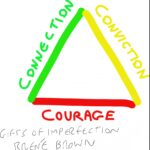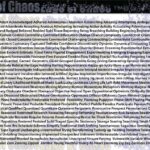Transform your career by shifting: Shift 11 – From Trust As Control To Trust As Faith
There comes a point in all things that really matter in life when trying to exert control is not sufficient. The complexities of the world make it impossible to be any more planned or prepared, there will always be some loose ends, some possibilities that cannot be thought out in advance. When we reach these points, if we are to confront them effectively with imagination, creativity, optimism and hope, we need to shift our trust in the power of control and embrace trust in faith.
Trust as Control
Too often people misuse the word “trust” when what they really mean is control. When they say “I trust you” or even “I trust myself”, they are actually saying “I control you so tightly you can only do what I expect” or “I control myself so tightly, I can guarantee the outcome”. This can lead to some fairly predictable problems:
- It over-estimates our ability to control others or ourselves, or indeed the environment.
- It is a recipe for micro-management and a potent way of destroying openness, thinking or creativity
- It is in bad faith – there is no trust, only control.
Trust as Faith
The Oxford English Dictionary definition of trust is “trust (noun): ‘confidence, strong belief in the goodness, strength, reliability of something or somebody’, ‘responsibility’
have trust in (verb): ‘believe in the honesty and reliability of someone of something’, ‘have confidence in’, ‘earnestly hope’ ”
Look at the key words there:
- Confidence
- Belief
- Hope
Trust in fact has nothing to do with control, but has everything to do with faith. It is about uncertainty not certainty – you do not need to be confident or hopeful about an outcome, if that outcome is assured. Trust is about ambiguity, complexity and mystery. It is about the limits of what we know and indeed what is knowable.
When trust as control is not enough, or not desirable, we can shift to a stronger position of trust as Faith.
Faith in Self
It is a commonly heard injunction “to believe in yourself”, “to back yourself” during times of duress. Having faith in yourself is an important cornerstone of career development. There is plenty of evidence for the importance of this idea from clinical psychology such as Albert Ellis’ work on unconditional self-acceptance.
A recent favorite of mine is Brené Brown and her work on shame. In her book the Gifts of Imperfection she talks about the importance of Courage, Connection and Compassion. The last of these, Compassion, relates to compassion for ourselves as well as others. It means accepting who we are, and appreciating that it is OK for us to be limited in our powers to control or change things. I have written more about Brené’s work here and here.
Strengths-based approaches to Career Development that aims to build on existing strengths rather than overcome perceived “weaknesses” is another positive way of working on faith in the self. See this post on David Winter’s excellent blog Careers in Theory for more on this.
Faith in self also means recognizing that we are strong enough to confront whatever life throws at us. When this belief is lacking, our exploration of our own potential and of the world is also lacking. However this does not happen in isolation and our faith in ourselves is bolstered and also determines our faith in others.
Faith in Others
If you think having faith in self in hard enough, just wait until you have to put faith in others! In fact we unwittingly put faith in others all the time. Whether it is faith the builders did a good enough job to prevent your roof falling on you while you sleep, or faith in other drivers not to do something crazy, or faith in farmers not to poison us, we are steeped in faith for others.
It is fairly obvious that our actions become very self-limiting without this faith in others. If we believe we cannot rely on others, we will fail to reach out to them, and try to fulfill our needs ourselves or not even try. The result is self-limitation and social isolation. A potent recipe for depression.
Again, complexity is to blame. When we are in the grip of “Control fever”, we demand certainty from others. It is an impossible demand because the world and people in it are too complex and too inter-connected to permit certainty of outcomes. Trust as control here really means “I do not trust you”. When we do not trust, we are cautious, slow to move, closed and self-limited.
Trust as faith means to accept that ultimately we accept our own imperfections and in turn that allows us to be accepting of the imperfections of others. Thus we believe in ourselves and in others too. Indeed as Brené Brown points out, our love of others is limited by our love for ourselves. So too with faith.
Faith in the Universe
Wow! Why stop at faith in ourselves and others? What about the bigger picture? It strikes me that at some level, having faith in systems that our bigger than ourselves and our social circle is an empowering and transforming thing. Having faith that we belong and take our own place in Universe is not only reassuring, but gives us a sense of ownership and responsibility that transcends daily hassles and doubts, and provides:
- courage
- connection and
- contribution
We cannot predict and control everything in our lives, nor is it desirable to do so. We and the world we inhabit are complex, open and changing. Trust as control is a limited and potentially damaging response to those realities, it needs to be subsumed within trust as faith. It is perhaps the most important shift of all the Shiftwork principles.
Shiftwork is the work we have to do to manage, thrive and survive in a world where shift happens. I’ve identified 11 shifts that we have to make (see here), this was the final shift. The earlier ones you can read by following these links:
- first shift Prediction To Prediction And Pattern Making (see here)
- second shift From Plans To Plans And Planning (see here)
- third one From Narrowing Down To Being Focused On Openness (here)
- fourth shift From Control To Controlled Flexibility (see here)
- fifth shift From Risk As Failure To Risk As Endeavour (see here)
- sixth shift From Probabilities To Probable Possibilities (see here)
- seventh shift from Goals, Roles & Routines to Meaning, Mattering and Black Swans (see here)
- eighth shift from Informing to Informing and Transforming (see here)
- ninth shift from Normative thinking to Normative and Scaleable thinking (see here)
- tenth shift from Knowing In Advance To Living With Emergence
What other shifts do you think we need to make? What shifts do YOU need to make? Which of these shifts presents the biggest challenge to you? How are you going to SHIFT?
Related Posts












Pingback: Transform your career by shifting: Shift 11 – From Trust As Control To Trust As Faith | The Factory